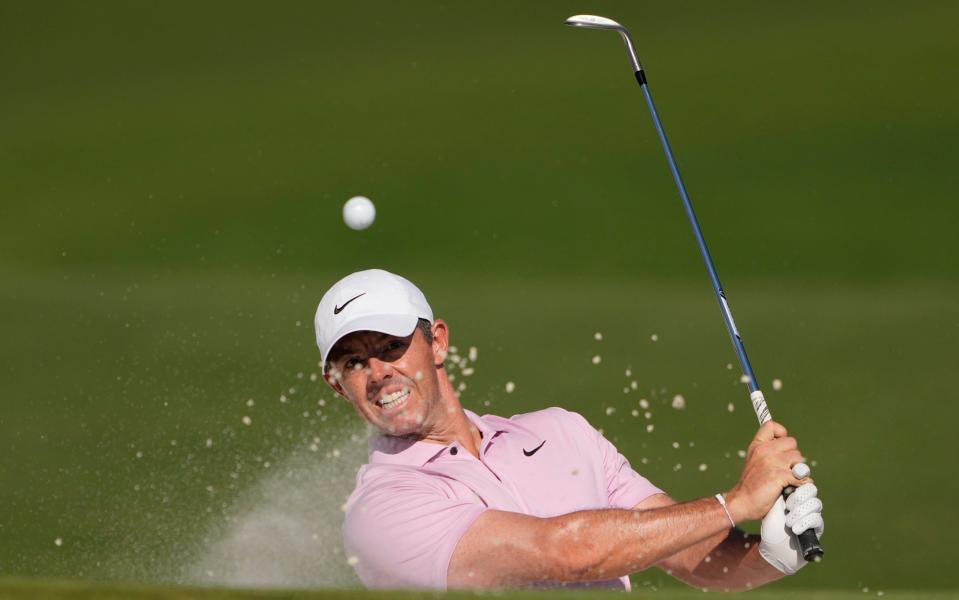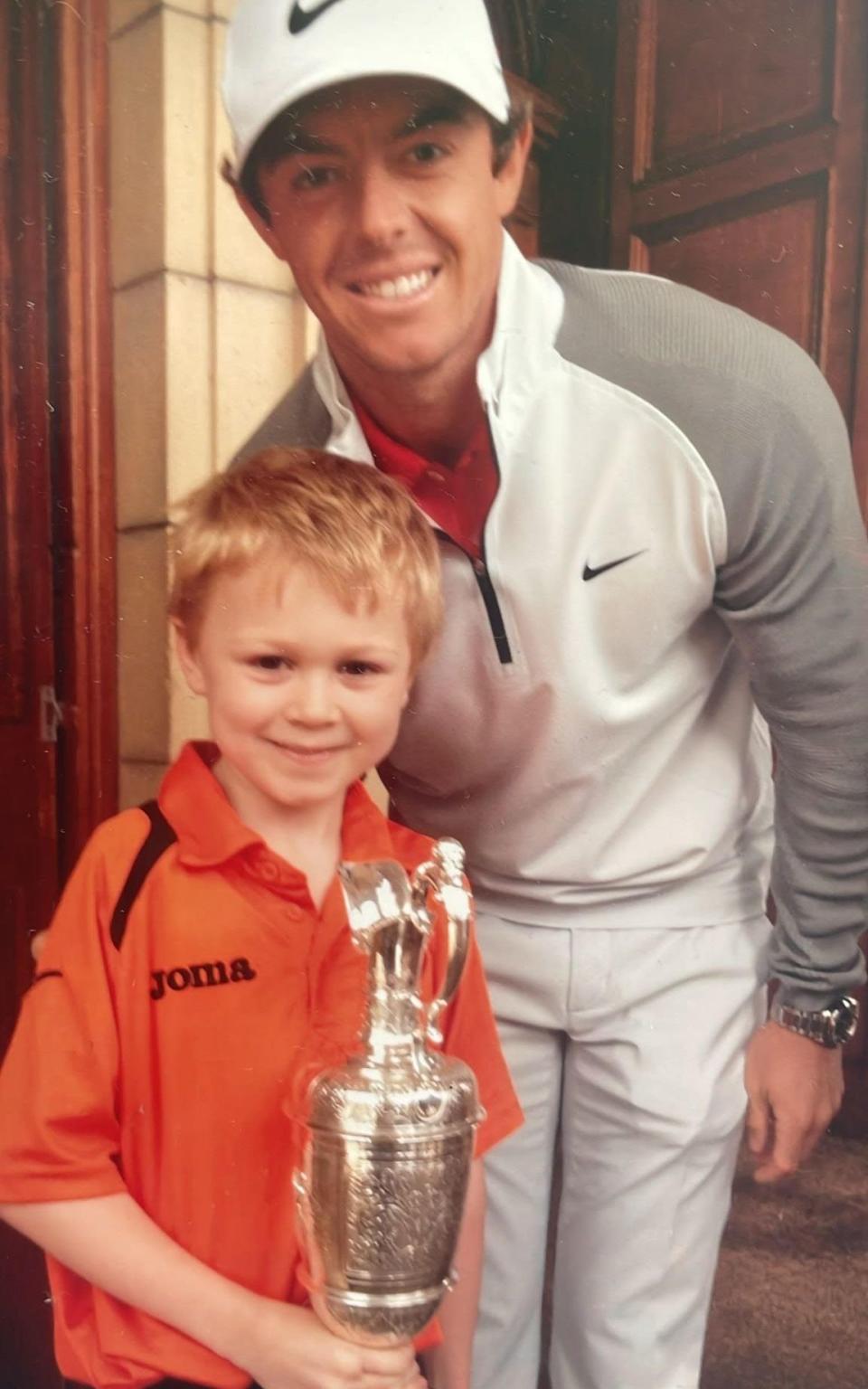Why I use my son’s height to measure Rory McIlroy’s 10-year major drought

In our house, we measure Rory McIlroy’s majorless run in inches, not years.
There is a picture on the noteboard in the kitchen. It was taken the week after McIlroy won The Open at Hoylake and a fortnight before he triumphed at the US PGA at Valhalla.
I was interviewing McIlroy at sponsor’s day at Gleneagles and with his mother at work, my six-year-old son accompanied me. McIlroy is fantastic with kids and quickly put Paddy at ease, swapping the Claret Jug for the shy little boy’s Game Boy. For the obligatory picture, McIlroy had to stoop down. Paddy was not even 4ft.
Now, 10 years on, he is 6ft and would tower over the world No 2. My wife and I joke about that; not at McIlroy’s continuing attempts to win a fifth major since that incredible month in 2014, but simply because of the passing of time and how quickly they grow up. Occasionally the bars can be cruel, however.

Paddy does not like it when we show our friends the picture and laugh. He is protective of his sporting hero and does not see the problem. “So what if he has not won another major?” he says. “Rory already has four and has done everything else in the last decade. He is loaded, has a great life. If I were him, it wouldn’t bother me at all.”
On Monday morning, Paddy texted me. I was in Charlotte where McIlroy had brutally overhauled Xander Schauffele by playing an eight-hole stretch around the turn in eight-under. “Rory wins this week at Valhalla,” the message read. “The stars are aligned.”
He had heard McIlroy say the same on the radio. Going to Louisville as a 25-year-old, McIlroy had also prevailed in his previous two tournaments. Granted, the Zurich Classic pairs event - which he won last month with Shane Lowry - is hardly The Open and, to be honest, the Wells Fargo Championship is not quite the WGC-Bridgestone Invitational at Akron, where McIlroy won the week before the 2014 US PGA.

But there does seem to be a certain symmetry and the most important thing is that McIlroy believes there could be. If McIlroy had stayed in the rut that typified his game through February to the Masters, there would have been a danger of him returning to Valhalla plagued instead of buoyed by the memories of last time.
Now he will fairly skip through the gates and if you had lived under a rock for the last 10 years, apart from the grey hairs, you would be forgiven for thinking not that much has changed. But it has for McIlroy and overwhelmingly the changes have been positive. A wife, a child and everything of which he could dream. Except that fifth major.
It is there gnawing away in the background and if it is not, then McIlroy would not be the great sportsman – one of the greatest Britain and Ireland has ever produced – that he is. The recollections of that Sunday in Kentucky demand that he and we look back and try to figure out what went wrong, no matter how absurd an exercise that soon becomes.
That night after he had denied Phil Mickelson and Rickie Fowler by a shot, four of us golf writers sat around a dinner table and played a game of guessing how many McIlroy would reach. The most was 12, the least was eight. I said 10. It was not even a question that he would better Sir Nick Faldo’s six, the most of any European in the modern age. Not after he had proved he could win from behind as well as from the front.
His first three majors were all largely processions, although there were a few anxious moments at Hoylake in the final round. He never conceded the lead, however. He did three weeks later. McIlroy fell three behind with nine to play, but after a lucky break for an eagle on the 10th – why is it invariably the greats who capitalise on great breaks? – he clinically hunted down a stellar leaderboard. Later he told a group of us that he felt he had not only added another major to his trophy cabinet, but another string to his bow. He had developed an aura.
So why not since? Well, which theory do you want? The mental trauma caused by missing the next year’s Open at his beloved St Andrews because of an ankle injury in a kickabout? The advance of the new generation led by Jordan Spieth as he won the first two majors of 2015? The creeping spread of self-doubt? The dwindling hunger? The piling millions? The inability to reinvent? The destructive effects of the missing green jacket?
One or perhaps two or three of these might have relevance, otherwise, it is merely shameless armchair psychology.
For the last two years, as McIlroy first became the voice against LIV, before emerging as the spokesman for a peace deal with the Saudis, a new argument has gained popularity and that is he should leave the politics and focus on the sport.
Yet this ignores the truth that during this spell he has statistically played the best golf of his life and that with two runners-up in the majors and a third in the last three years, he has looked closer than ever to ending the drought.
McIlroy has no other option but to cling to this positivity and the fact that in the 35 majors he has contested since Valhalla he has recorded 20 top-20s, 18 top-10s and nine top-fives. He has collected 21 titles in this time, won three PGA Tour FedEx Cups, four DP World Tour order of merits, been named PGA Tour player of the year, DP World Tour player of the year, spent another 79 weeks as world No 1, featured on three winning Ryder Cup teams…
It has been anything but a slump. In fact, for the vast majority of his peers it would amount to a glorious career. If you still want to claim he has failed then fine, but recognise that he has fallen short by inches. And yes, that probably is the wisest method to measure it.
